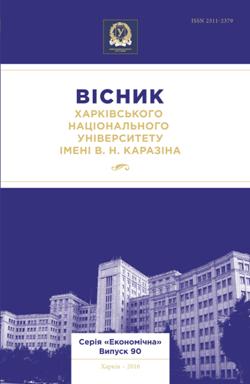Analysis of relationship between interpersonal trust and social and economic indicators
Abstract
The paper deals with the analysis of the type and the degree of relationship between the interpersonal trust index and social and economic indicators: Income (GDP per capita), Inequality (Gini coefficient), Human development index (HDI), Corruption (Corruption perception index). The methods of correlation analysis and neural network modeling are applied. The World Bank, World Values Survey (WVS) and European Social Survey (ESS) database is used. The analysis was carried out on the sample of 105 countries, where WVS and ESS interviews were conducted.
The closest correlation dependence was found out between the trust index and HDI in a group of high human development countries, as well as among high income countries. The correlation is positive in these cases. In medium and low income level countries this relationship is weak and contradictory. The correlation between trust and corruption perception has similar nature: high income countries are characterized by close positive relationship between trust and corruption intolerance, in the low-income group this relationship is weaker, and in the group of middle income countries the correlation is negative.
The weakest relationship is observed between the trust and GDP per capita (in the high income group it is positive, in the low income countries it is negative). There is negative weak correlation with Gini index in all the groups, except for the countries, where trust level is high: correlation dependence is strong there).
Using a neural network model based on GDP per capita, the human development index and the corruption perception index, it was shown the possibility to predict the trust index for a group of high income countries.Downloads
References
Lewis J. D. Trust as a social reality / J. D. Lewis, A. Weigert // Social Forces. – 1985. – Vol. 63. − № 4. – P. 967–985.
Ostrom E. A Behavioral Approach to the Rational Choice Theory of Collective Action: Presidential Address, American Political Science Association / E. Ostrom. − The American Political Science Review. – 1997. – №1. – Р. 1–22.
Кривошеева-Медянцева Д. Д. Доверие как фактор экономического развития: исследования с позиций институциональной экономической теории / Д. Д. Кривошеева-Медянцева // Terra Economicus. — 2013. — № 2. — С. 15–20.
Татарко А. Н. Межличностное доверие как фактор социально-экономического развития / А. Н. Татарко // Социальная психология и общество. — 2014. — № 3. — С. 28–41.
Ortiz-Ospina, E. Trust [Electronic resource] / E. Ortiz-Ospina, M. Roser // Our World in Data. – 2016. – Access mode: https://ourworldindata.org/trust (last access: 06.03.17).
Фукуяма Ф. Доверие: социальные добродетели и путь к процветанию: Пер. с англ. / Ф. Фукуяма. – М. : ООО «Издательство ACT»: ЗАО НПП «Ермак», 2004. – 730 с.
Arrow, K. J. The organization of economic activity: issues pertinent to the choice of market versus non-market allocations. / K. J. Arrow. – Collected papers of Kenneth J. Arrow, volume 2: general equilibrium, Cambridge, Massachusetts: Belknap Press, 1983. – Pp.133–155.
Coleman, J. S. Social Capital in the Creation of Human Capital. / J. S. Coleman. – American Journal of Sociology, No. 94, 1988. – p. 95–120.
Меркулова Т.В. Измерение доверия: сравнительный анализ методов // Прикладні аспекти прогнозування розвитку складних соціально-економічних систем : монографія / Т.В.Меркулова; за ред. О.І. Черняка, Н.В. Захарченка. – Бердянськ : Видавець Ткачук О.В., 2015. – С. 118–131.
Tamara Merkulova, Tatiana Bitkova. Trust measurement: comparative analysis of experimental and sociological methods // Good Connections. Trust, cooperation and education in the mirror of social sciences. Rocznik Lubuski, Tom 42, część 2a. Pod redakcją Doroty Bazuń, Mariusza Kwiatkowskiego. Zielona Góra 2016. – P. 23–33.
Glaeser, E., D. Laibson, J. Scheinkman, and Christine Soutter, “Measuring Trust,” Quarterly Journal of Economics. – 2000. – 115(3). – Р. 811–846.
Delhey, J. & Newton, K. (2003). Who Trusts? The Origins of Social in Seven Societies. European Societies 5(2):93–137.
Официальный сайт ESS: http://www.europeansocialsurvey.org/
Официальный сайт WVS: http://www.worldvaluessurvey.org/wvs.jsp
Официальный сайт World Bank: http://www.worldbank.org/

